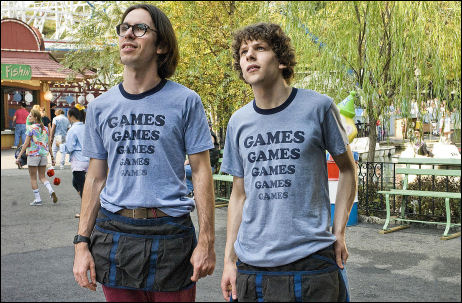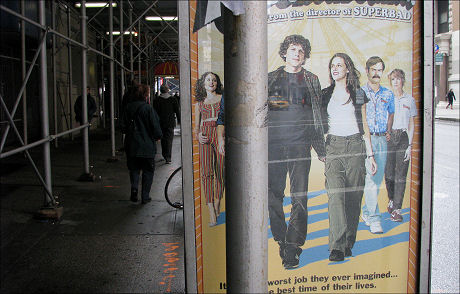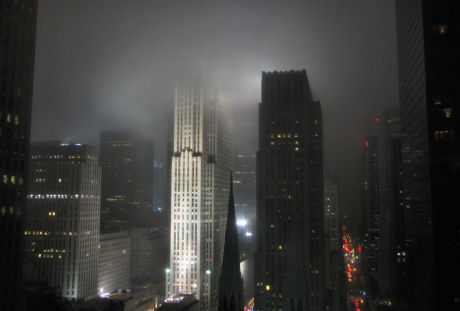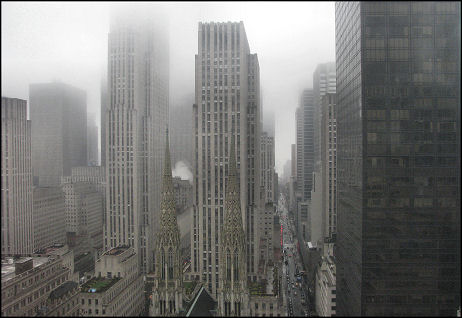It’s criminal and appalling, but the apparent fact is that quality-level DVD rips of The Hurt Locker have been on Pirate Bay for a long while now. And last night a journalist pal told me that a bootleg bum sold him a “clean” DVD of Kathryn Bigelow‘s film the day before yesterday in the Bronx. For a dollar. Which means that other bootleg gypsies are selling it also, not just in New York but in grubby, down-at-the-heels areas of every city in the country.
 Jeffrey Wells
Jeffrey Wells
Guilty Aforethought
A Manhattan all-media Observe and Report screening is happening tomorrow night. I consider it vital to attend and report. I was told last night that the ending is (this may be putting it too specifically) Travis Bickle-ish. Whatever. The guy I spoke to called it Seth Rogen‘s last fat role — his no-holds-barred kiss-off to the fat chapter in his life.
Showest Standing
Collider‘s Steve Weintraub has just posted some pics of various new standee posters being displayed at Showest, which starts tomorrow in Las Vegas. The only one that got me besides the Hurt Locker poster is the one for Robert Downey, Jr., and the Curse of the Crystal Indiana Holmes.

“If he doesn’t die today, there’s always tomorrow.”
Turndown Day
As I began to say last Thursday, Greg Mottola‘s Adventureland (Miramax, 4.3) is modestly pleasing — a period relationship drama with comedic spritzing that’s unforced, settled down, not bawdy or coarse, and proportionately buyable. That’s another way of saying it’s a piece of recognizable realism with two solid, nicely unpretentious performances from Jesse Eisenberg and the always sublime, rock-sexy Kristen Stewart.
When I begin to watch a film about kids in their early 20s doing whatever, I silently pray to myself, “Please don’t let it be stupid.” Or “please let the characters not be gullible or at least have a shred or two of common sense, or at least a capability for intelligent dialogue….please.” Most of the time films of this sort fart in my face, but not this sucker. Adventureland is bright and honest and restrained in a likable, low-key way.
I didn’t like some aspects. I could have done without the stabs at humor. (They feel off-point.) The parents of Eisenberg’s character — Jack Gilpin, Wendie Malick — felt overly curt and charicatured. But I was generally pleased. Not to the point of doing cartwheels in the Brill building lobby, but a film can put you in a pretty agreeable place without making you get all gymnastic.
The irony is that this intelligent, mild-mannered quality may turn out to be a commercial problem. There’s almost nothing in it for the apes who love the downmarket obviousness of the cruder Judd Apatow comedies (I Love You, Man, Forgetting Sarah Marshall, The Year One).
I can just hear the word-of-mouth outside the plexes next weekend. Viewer #1: “So is it funny? Is it foul? Do girls get naked in it? Does anyone lean out of a moving car and throw up?” Viewer #2: Uh, well…no. It’s not really a comedy-comedy. In fact, it’s not even a dramedy. Nobody gets pissed on or thrown up on. Nobody gets naked. It’s more of a nice little realistic love story between two fairly aware people. No tricks or gross-outs.” Viewer #1: “Fuck that!”

Martin Starr, Jesse Eisenberg
Set in the early ’80s Pennsyvania, it’s about a virginal college grad (Eisenberg) who takes a nothing summer job in a local amusement park after being told by his parents that they can’t afford to pay for his grad-school tuition, much less a trip to Europe. He gradually falls in love with coworker Em (Stewart), who slowly begins to reciprocate despite a side affair she’s having with Connell (Ryan Reynolds), an older married guy who works as the park’s mechanic.
Secondary loser-type characters float in and out — the park owner (Bill Hader ) and his wife (Kirsten Wiig), a brainy Jewish nerd type (Martin Starr), a straight-laced hottie (Margarita Levieva ). Various obstacles, complications, and distractions manifest. But the Eisenberg-Stewart thing — will they? can she? should he? — is the main order of business.
And it all cruises along within an ’80s period vibe. Like a cousin of All The Right Moves. Everything looks and feels a bit grubby and low-thread. Terry Stacey‘s cinematography has a slightly downgraded feeling to it, like a none-too-slick New Line film of the era.
Mottola, the director-writer, uses Lou Reed‘s “Satellite of Love” on the soundtrack (and even throws in a discussion about the lyrics at one point), but the song that seems to sum up Adventureland, for me, is “It’s A Turn Down Day” by The Cyrkle. Generationally wrong, of course, but tonally or attitudinally it’s somehow right in line. I can’t explain it any more fully than this.
Not The Future
Interview has done Zac Efron no favors. He’s too generic, too pretty, too mild, and too accomodating to be any kind of tomorrow guy. If anything he’s the past in the sense that he’s Guy Madison, Troy Donahue, Tab Hunter, the Bay City Rollers, etc. His best performance so far was in Me and Orson Welles (which I saw in Toronto). His cautious manner in that film is oddly appealing in that he seems to know he’s not much of an actor and is wisely staying within a safe perimeter.

Indiana Houdini Holmes
Borys Kit‘s 3.26 story about Summit Entertainment buying film rights to William Kalush and Larry Sloman‘s “The Secret Life of Houdini: The Making of America’s First Superhero” invites mockery, as Summit intends to do the same thing with Harry Houdini that Joel Silver and Guy Ritchie are doing with Sherlock Holmes in their upcoming film, which is to turn him into a generic bullshit superhero with washboard abs.
The operative portion of Kit’s story says that “the studio is not looking to make a biopic but rather an action thriller featuring a character who is part Indiana Jones and part Sherlock Holmes. Summit hopes to cash in on worldwide recognition of Houdini’s name while potentially launching a franchise.”
Summit is into the idea because Kalush and Sloman’s book claims that Houdini “acted as a spy for Britain and was asked to be an adviser to Czar Nicholas II’s court in prerevolutionary Russia.”
Indications are that the spy angle is, at best, a nugget. Amazon reviewer John Cox acknowledges that in 1902/3 Houdini sent “reports” from Germany and Russia back to Superintendent William Melville of Scotland Yard (who was then head of what could be considered British Intelligence). Does this mean Houdini was a spy, or just a letter writer who felt compelled to report what he was seeing to his friend in London?
Kalush and Sloman “do make some interesting connections back to America and the shenanigans with Houdini’s passport application,” says Cox, “but it’s all very speculative.”
I studied Harry Houdini extensively during the preparation and writing of a 30-page report, written for producer Ray Stark in 1989, about the viability of several Houdini scripts that Stark had optioned or bought. The bottom line with Houdini was that he was always a romantic eager-beaver who saw himself as a dramatic figure, and his letters to Melville, I believed (and still believe), were more about Houdini’s love of being involved in the espionage hurly burly of the day…nothing more.
Startup
Ramin Bahrani‘s Goodbye Solo, which no one invited me to see at a press screening but which I was going to pay to see at the Angelika this weekend (largely because of Tony Scott’s review), has reportedly grossed $40,540 from three screens in New York and Chicago. The reason I didn’t go Friday night or yesterday is because I’m only feeling intrigue and/or interest, which is not the same thing as serious hunger.
Yeah, But…
Yesterday afternoon Variety‘s Tatiana Siegel reported that David O. Russell is attached to direct The Silver Linings Playbook, his own adaptation of Matthew Quick’s novel, for the Weinstein Co.
Russell’s last teaming with the Weinstein brothers was on Flirting With Disaster, which was released in ’96. Wow….doesn’t seem like 13 years ago.
Seigel rotely mentions Russell’s Nailed, the Jessica Biel-Jake Gyllenhaal dramedy which had a troubled stop-and-start shoot due to Capitol Films’ shaky financial footing. But she doesn’t even hint when the film may be seen. Isn’t that the chief pressing issue as we speak? I’m hoping to hear it’ll play in Cannes. Wouldn’t that make sense, given the stakes?
Publisher’s Weekly provides the following synopsis for Quick’s novel:
“Pat Peoples, the endearing narrator of this touching and funny debut, is down on his luck. The former high school history teacher has just been released from a mental institution and placed in the care of his mother. Not one to be discouraged, Pat believes he has only been on the inside for a few months — rather than four years — and plans on reconciling with his estranged wife.
“Refusing to accept that their apart time is actually a permanent separation, Pat spends his days and nights feverishly trying to become the man she had always desired. Our hapless hero makes a friend in Tiffany, the mentally unstable, widowed sister-in-law of his best friend, Ronnie. Each day as Pat heads out for his 10-mile run, Tiffany silently trails him, refusing to be shaken off by the object of her affection.
“The odd pair try to navigate a timid friendship, but as Pat is unable to discern friend from foe and reality from deranged optimism, every day proves to be a cringe-worthy adventure. Pat is as sweet as a puppy, and his offbeat story has all the markings of a crowd-pleaser.”
Running Scared
Death threats from Mexican gangs have reportedly persuaded the makers of Queen of the South, an adaptation of a popular pulp novel about murder and revenge among Latino mafiosos, to not only abandon shooting in Mexico but shut down altogether.

Queen of the South costars Josh Hartnett, Eva Mendes, Ben Kingsley.
The initial graph in Guy Adams‘ 3.29 story Independent story reports that the death threats led director Jonathan Jakubowicz and his producers to abandon plans to shoot in the Mexican coastal region of Sinaloa.
But a followup graph says “the plug has now been pulled on the project. Adams then posts a statement from Jakubowicz, to wit: “I’ve worked really hard to make this beautiful movie, but the safety of my family and my team comes first. Making this movie [would have] put us all at risk, not only in Mexico but in the U.S.”
Queen of the South costars/would have costarred Eva Mendes, Josh Hartnett and Ben Kingsley.
“Jakubowicz and his family apparently received threats while at home in Los Angeles,” the story says. “The shaken filmmaker this week warned colleagues to think twice before attempting to take on similar projects. “I beg those involved to be responsible and mindful of the dangerous territory the subject matter inevitably gets them into,” he said.
Adams writes that “the news will heighten fears that Hollywood production, which has become a growing contributor to the Mexican economy, may disappear from the country, amid the surge in violence which has killed nearly 7,000 people in the past year.
“Many other Hollywood producers, who may be tempted to shoot south of the border because of lower production costs and tax incentives, are also now starting to think twice. Security has been a growing problem since 2005, when Jennifer Lopez and Antonio Banderas‘s Bordertown was forced to move production to New Mexico after its crew was followed and had their hotel rooms ransacked.
Queen of the South might (I say “might”) have been a good thing for Mendes — the part of Teresa Mendoza would basically be that of a female Tony Montana.
Publisher’s Weekly describes Arturo Perez-Reverte‘s Queen of the South novel as follows: “The gritty world of drug trafficking in Mexico, southern Spain and Morocco, offering a frightening, fascinating look at the international business of transporting cocaine and hashish as well as a portrait of a smart, fast, daring and lucky woman, Teresa Mendoza.
“As the novel opens, Teresa’s phone rings. She doesn’t have to answer it: the phone is a special one given to her by her boyfriend, drug runner and expert Cessna pilot G√ºero D√°vila. He has warned her that if a call ever came, it meant he was dead, and that she had to run for her own life. On the lam, Teresa leaves Mexico for Morocco, where she keeps a low profile transporting drug shipments with her new lover.
“But after a terrible accident and a brief stint in prison, Teresa’s on her own again. She manages to find her way, but Teresa is no mere survivor: gaining knowledge in every endeavor she becomes involved in and using her own head for numbers and brilliant intuition, she eventually winds up heading one of the biggest drug traffic rings in the Mediterranean.
“Spanning 12 years and introducing a host of intriguing, scary characters, from Teresa’s drug-addicted prison comrade to her former assassin turned bodyguard, the novel tells the gripping tale of ‘a woman thriving in a world of dangerous men.'”
Overrated
Maureen Dowd is in double-lite mode this morning, reacting to Lula’s statement that the worldwide economic crisis was caused by “irrational behavior of white people with blue eyes.” Which he meant metaphorically, of course, which Dowd chooses to ignore for humor’s sake. Life does occasionally favor those with blue eyes, but the things that can trip you up despite this supposed advantage are myriad. I should know, having (a) blue eyes and (b) made more mistakes than I’d care to mention.
Downtime

Pear cake purchased yesterday afternoon at Dean & Deluca. All natural tasting, no sugary flavors, good as it gets, enjoyed by all.
Dispatches
There are so many newspaper buyouts, layoffs, firings and salary rollbacks these days that every time I see a flurry of fresh reports along these lines, I write anyone I know who’s working for one of the beseiged publications and I say “how goes it?” I wrote this to two friends today. One of them wrote back with the following: “Am I okay as in ‘do I still have job security’? Yeah. Am I okay as in ‘how do I cope with an 11.5% paycut’? Remains to be seen.”



